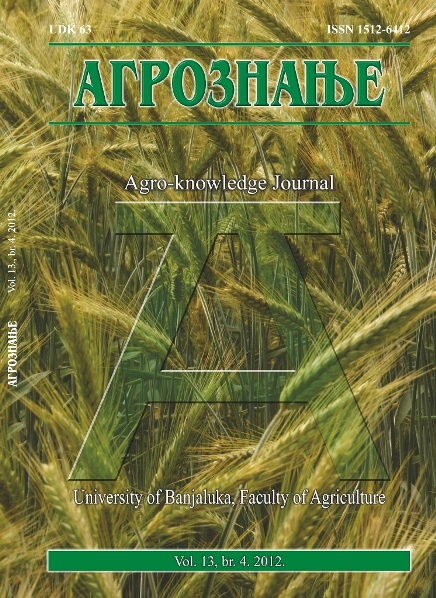Policy Measures for Development of Rural Entrepreneurship: an Example of EU Financial Support for Local Infrastructural Investments in Poland
DOI:
https://doi.org/10.7251/AGREN1204603WAbstract
Implementing the objective of convergence, the European Union actively participates in the economic development process of individual countries and regions. This participation is expressed in the formation of principles of the structural and regional policy, as well as cohesion policy, which cover the offer of a wide range of instruments to support the development of business activity. The European Union policy in business activity development, particularly small and medium-sized enterprises, is undergoing a certain evolution. The assumed solutions drive towards extending the influence period of public funds. The direct financial instruments of support are diversified in order to limit the funds intended for venture grants, which in turn allows an increase in the involvement of financial engineering instruments. Furthermore, significant funds are designated for indirect support instruments associated with the creation of business environment. They include the broadly-understood technical and social infrastructure, covering the infrastructure of local significance, the development of which continues to be highly important to the competitiveness of enterprises located within the rural areas of Poland. Disproportions between rural and urban areas in infrastructural equipment are still present, even growing. Due to the above, this study aimed to define the scope of instruments used by the policy oriented towards the support of business activity development and to create a classification of the said instruments according to their mode of influence. The created classification also included infrastructure as one of the main factors in business activity development. Furthermore, the relationships between communal infrastructural investments and the changes in the number of business entities were subjected to evaluation. This approach aimed to answer the question of whether the distribution of public funds planned for communal investments affects the equalisation of the conditions of competition in both the rural-urban system and within rural areas. The implementation of the said objectives also included the following research methods: studies of professional literature, descriptive analysis, comparative analysis and correlation analysis. The data of the Central Statistical Office, Bank of Regional Data, were used as empirical material. The research was conducted for the period 2006-2010.
The conducted research indicates that the support for infrastructural development will not stop the process of the growing difference between rural and urban areas in terms of economic development. However, the subsidisation of the infrastructural investments with Union funds somewhat affects the levelling of the economic development differences among rural communities resulting from the changes occurring in the non-agricultural sectors of the economy. Utilisation of EU funds has led to a higher growth of the number of business entities, as well as own budget revenues. The infrastructural investments implemented within the scope of RDP 2007-2013 measure "Basic services for the economy and rural population" created a better business environment for approximately 5 million inhabitants of rural communities. Such situation leads to the conclusion that financial support to communal infrastructural investment is a very effective measure of business development.
